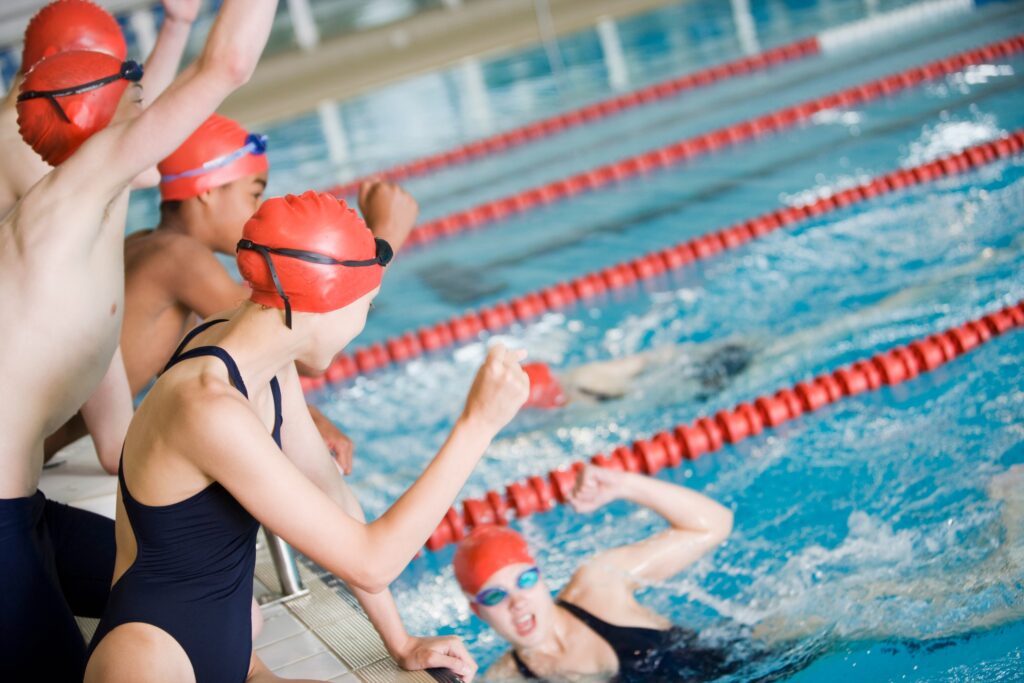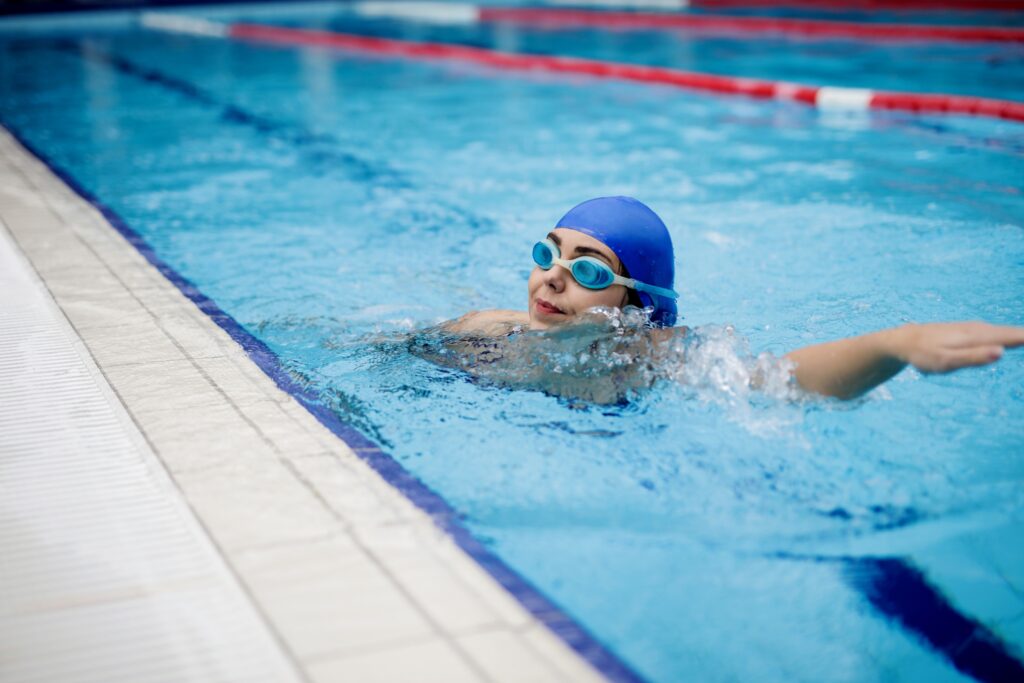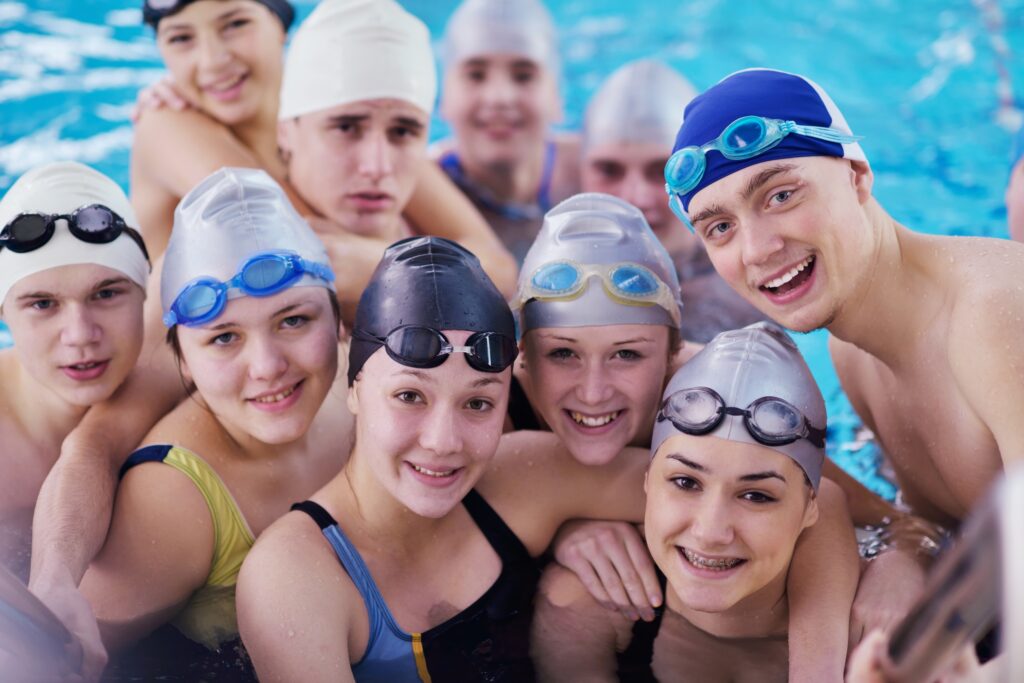
7 Reasons You Should Consider Swim Lessons for Teens
April 19, 2024
Adolescence is a pivotal stage in life where experiences significantly shape personal development. Among these experiences, teen swim lessons stand out for their comprehensive benefits that extend well beyond the pool, offering a blend of physical, mental, and social advantages.
In this blog, we’ll be discussing the multifaceted impacts of teen swim lessons. From fostering physical health and enhancing mental well-being to developing social skills and instilling crucial safety knowledge, the benefits are profound and far-reaching. Swimming is not just an activity but a vital life skill that can significantly impact the overall development of teens, including building confidence, self-esteem, and a strong work ethic.
Join us as we dive into each of these benefits, shedding light on how swim lessons for teens are not just an activity but a transformative experience that contributes significantly to holistic adolescent development, with a special focus on building and improving swimming skills through structured lessons.

A Foundation for Lifelong Health
Swim lessons for teens lay down a foundation for lifelong health. Regular swimming not only improves cardiovascular conditioning but also enhances lung capacity and promotes endurance. The unique resistance water provides when swimming helps build lean muscle mass and supports joint health, making it an ideal, low-impact workout for teens.
This foundation of physical activity encourages teens to maintain an active lifestyle, contributing to long-term health benefits and preventing lifestyle-related diseases. Additionally, swim lessons improve front and back crawl techniques, essential for building water safety skills and preparing for competitive swimming.
A Boost in Self-Confidence
Achieving milestones within swim lessons for teens, such as completing a set distance or mastering a new stroke, provides a substantial boost in self-confidence, allowing them to progress at their own pace. This sense of accomplishment is particularly vital during the teenage years, a period often marked by self-doubt and a high susceptibility to peer pressure. Each small victory in the pool serves as a concrete reminder of their capability and resilience, fostering a stronger sense of self.

This burgeoning confidence extends beyond the aquatic environment. Teens learn that dedication and perseverance lead to success, a lesson they can apply to academic pursuits, personal hobbies, and future career endeavors. The discipline required to improve in swimming—setting goals, persisting through challenges, and celebrating progress—equips teens with a mindset geared towards achievement and personal growth.
Moreover, the physical benefits of swimming—improved strength, endurance, and a healthy body image—further contribute to a teen’s self-confidence. Feeling physically capable and strong empowers teens to appreciate their bodies for what they can do, not just how they appear, fostering a healthy body image and self-respect.

Enhancing Academic Performance
Interestingly, the benefits of swim lessons for teens also extend into academic performance. Research has shown a positive correlation between regular physical activity and improved cognitive function.
Swimming, in particular, requires concentration, coordination, and rhythmic breathing, which can enhance focus and memory retention. These skills are invaluable in an academic setting, suggesting that teens who engage in swim lessons may also find an improvement in their studies.
Social Integration and Teamwork in Swim Team
Formal swimming lessons for teens not only contribute to reducing stress levels and improving mental health but also offer a unique platform for social integration and the cultivation of essential teamwork skills. Within the structure of group lessons or swim teams, teens find themselves immersed in a collaborative environment where each individual’s effort contributes to the collective success. This dynamic setting is not just about learning to swim; it’s about learning to work together, share common goals, and support one another.

The act of participating in group swim lessons or being part of a swim team fosters a sense of community among teens. They learn the importance of communication, as coordinating strokes and movements requires clear, concise interaction. Through these activities, teens enhance their ability to express ideas, listen actively, and provide constructive feedback, skills that are invaluable in both personal and professional spheres.
Additionally, the social interactions facilitated by swim lessons for teens play a crucial role in building lasting friendships. Shared experiences, common challenges, and the joy of achievement create bonds that can last a lifetime. For many teens, these friendships provide a vital support network during a formative period of their lives, contributing to a stronger sense of belonging and improved self-esteem.
Mental Health and Stress Reduction
The mental health benefits of swim lessons for teens cannot be overstated. Swimming has been recognized for its ability to reduce stress levels, alleviate anxiety, and combat depression.

The rhythmic nature of swimming and the mental discipline required to focus on techniques can serve as a form of moving meditation, providing teens with a mental break from the stresses of daily life. This aspect of swimming is especially crucial in today’s fast-paced world, where teens are increasingly facing mental health challenges.
Environmental Awareness and Conservation
Swim lessons for teens are crucial for teaching water safety, as they not only enhance swimming skills but also promote safety in a supportive environment. Swim lessons for teens also play a role in fostering environmental awareness and conservation. Learning to swim in natural bodies of water can cultivate an appreciation for the environment and the importance of water conservation.

Teens become aware of the delicate balance of aquatic ecosystems and the impact of human activities on water quality. This awareness can inspire a commitment to conservation efforts and responsible behaviors that protect our natural resources.

Water Safety and Safety Beyond the Pool
The safety skills taught in swim lessons for teens have applications beyond the pool. Teens learn about water safety, but they also gain knowledge that applies to other areas of life, such as risk assessment, emergency response, and the importance of following safety protocols [link to CPR training blog]. These skills are invaluable as teens become more independent, providing them with the tools to navigate various situations safely.
Final Thoughts
Swim lessons for teens, available at a community pool, are an invaluable component of adolescent development, offering a spectrum of benefits that extend into various aspects of life. Including youth swim lessons, this program is designed to be inclusive for different age groups, from building a foundation for lifelong health, boosting self-confidence, enhancing academic performance, to fostering environmental awareness and teaching critical safety skills, the advantages are profound.

Enroll Your Teen in Youth Swim Lessons at urSwim
Our programs at urSwim not only provide comprehensive swim lessons for teens but also offer lifeguard training for those interested in advancing their aquatic education. This dual opportunity opens up pathways for teens not just to learn and grow in a supportive environment but also to potentially secure a job in the field. Such roles can be incredibly rewarding, offering the chance to apply their skills practically while pursuing further education.To explore how you or a teen you know can benefit from these transformative opportunities, visit our swimming classes page for more information on swim lessons for teens and lifeguard training programs.
Marina Mentzel is a dynamic leader shaping the aquatics management industry. A former competitive swimmer, Marina founded urSwim in 2011 with a deep love for swimming and a passion for sharing it with others.
MARINA MENTZEL
urSwim Founder & CEO
see all posts
Leave a Reply Cancel reply
View our Services!
No matter what your swimming needs are, we can help get you there, stroke by stroke!